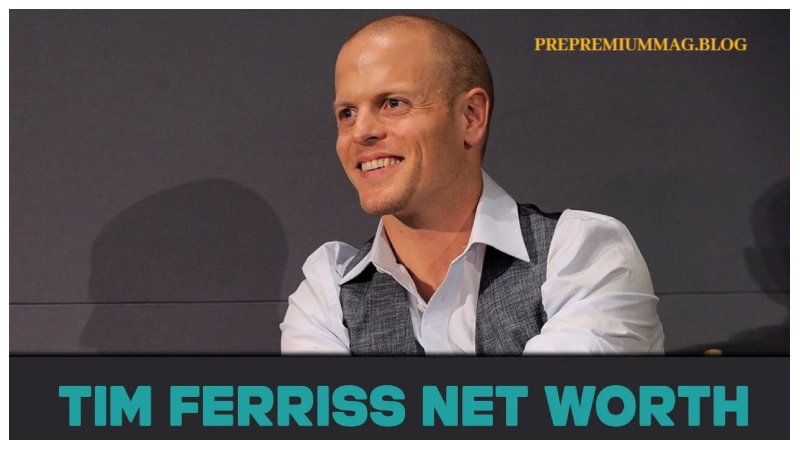This article delves into Tim Ferriss’ net worth, career, and the lessons we can learn from his innovative approach to work and life. Tim Ferriss has become a globally recognized entrepreneur, author, and podcast host, amassing a fortune through his unique strategies and mindset. The article explores how Ferriss built his wealth through his bestselling books, including The 4-Hour Workweek, and his smart investments in companies like Uber and Twitter. It also highlights the impact of his 4-hour philosophy, which challenges conventional work practices and emphasizes efficiency and freedom.
Ferriss’ philosophy extends to health, learning, and personal growth, encouraging individuals to experiment and prioritize what truly matters. The article further examines his personal life and philosophy, focusing on his advocacy for mental health and continuous improvement. Ultimately, Tim Ferriss’ legacy lies in his ability to inspire change and empower others to live more fulfilling, optimized lives.
Tim Ferriss’ Net Worth: A Snapshot
Tim Ferriss’ net worth reflects his diverse ventures, investments, and ability to capitalize on opportunities. As of 2023, Ferriss’ wealth is estimated at $50 million, with projections suggesting it could reach $100 million by 2025. This impressive fortune comes not only from his books and podcasts but also from his smart investments in early-stage companies that have become industry giants.
The launch of The 4-Hour Workweek in 2007 was a game-changer, selling millions of copies globally and establishing Ferriss as a leading figure in productivity and entrepreneurship. The book’s success provided a solid foundation for Ferriss’ career, generating substantial royalties and creating a global platform for his ideas. This financial success was followed by his subsequent bestselling books, The 4-Hour Body and The 4-Hour Chef, each contributing significantly to his wealth.
Ferriss is also a savvy investor, with early investments in companies like Uber, Shopify, and Twitter, all of which became massive success stories. These investments have been instrumental in building his fortune, as his early stake in these businesses turned into substantial returns. His strategic foresight has demonstrated his ability to identify promising startups before they hit the mainstream.
Additionally, Ferriss has made money through his popular podcast, The Tim Ferriss Show, which generates substantial revenue through sponsorships, ads, and partnerships. With millions of downloads per episode, the podcast is a key asset in Ferriss’ growing financial portfolio.
Overall, Tim Ferriss’ net worth is a result of a diversified and strategic career, combining writing, investing, and content creation to create lasting wealth and influence.
How Tim Ferriss Built His Fortune
Tim Ferriss’ journey to building his fortune is a testament to his ability to innovate, diversify, and seize opportunities. The cornerstone of his wealth is his breakout book, The 4-Hour Workweek, which transformed how people view productivity and work-life balance. The book’s global success not only earned him substantial royalties but also established Ferriss as a thought leader in the realms of entrepreneurship and self-improvement. The royalties from subsequent books like The 4-Hour Body and The 4-Hour Chef further added to his income stream.
In addition to his writing, Ferriss became an astute investor. His early-stage investments in companies like Uber, Shopify, and Twitter were key drivers of his wealth. By identifying emerging trends and placing smart bets on startups, Ferriss capitalized on these businesses’ explosive growth, securing significant returns on his investments. This investment portfolio, which includes companies that revolutionized their respective industries, has been a powerful contributor to his net worth.
Another major revenue source for Ferriss is his podcast, The Tim Ferriss Show. With millions of downloads per episode, the podcast generates revenue through advertisements, sponsorships, and affiliate marketing. Its success has allowed Ferriss to expand his influence, while simultaneously providing a consistent income stream.
Ferriss also monetizes his expertise through public speaking, online courses, and consulting. Each venture aligns with his personal brand and philosophy of efficiency and optimization, allowing him to continue earning and expanding his empire.
By combining multiple income streams, including book royalties, investments, and digital content, Ferriss has built a fortune that showcases his entrepreneurial foresight and business acumen.
The Impact of The 4-Hour Workweek
The 4-Hour Workweek, published in 2007, was more than just a book—it was a global movement. Written by Tim Ferriss, it became a New York Times bestseller and transformed how people perceive work, productivity, and lifestyle. The book introduced the concept of “lifestyle design,” encouraging readers to build a life that prioritizes freedom and fulfillment over traditional career structures.
At its core, The 4-hour Workweek challenges the conventional 9-to-5 grind, offering practical strategies to achieve more with less effort. Ferriss presented tools like the 80/20 principle (Pareto Principle) to focus on high-impact activities, automation to reduce repetitive tasks, and outsourcing to delegate low-value work. These methods, combined with his idea of leveraging remote work and passive income, gave readers a clear roadmap to escape the rat race.
The book had a profound impact on individuals and industries alike. It inspired the rise of the digital nomad movement, empowering people to work from anywhere while building location-independent businesses. Concepts such as dropshipping, affiliate marketing, and freelancing gained popularity, driven by Ferriss’ teachings.
Businesses also took notice, with many adopting flexible work policies and investing in task automation to improve efficiency. The relevance of Ferriss’ ideas has only grown with the expansion of remote work and digital entrepreneurship.
For Tim Ferriss, the book’s success not only elevated his status as a thought leader but also became a springboard for his personal brand and future ventures. Today, The 4-hour Workweek remains a cornerstone for anyone aiming to break free from the constraints of traditional work and design a life they truly love.
Exploring the “4-Hour” Philosophy
Tim Ferriss’ “4-Hour” philosophy extends far beyond the groundbreaking The 4-Hour Workweek. This minimalist yet high-efficiency approach has become the foundation of his brand, influencing millions of readers and listeners worldwide. His philosophy is centered on achieving maximum results with minimal effort, focusing only on what truly matters and eliminating distractions.
After the success of The 4-Hour Workweek, Ferriss expanded his ideas into other domains, including health and cooking. His second bestseller, The 4-Hour Body, delves into hacking health, fitness, and longevity. Ferriss conducted countless experiments on himself to identify the most effective strategies for fat loss, muscle gain, and optimal performance. His unconventional methods, like the Slow-Carb Diet, sparked widespread discussion and adoption by fitness enthusiasts.
In The 4-Hour Chef, Ferriss applied his philosophy to learning skills quickly. The book isn’t just about cooking—it’s about mastering meta-learning or the art of learning anything efficiently. By breaking down complex tasks into manageable steps, Ferriss teaches readers how to rapidly acquire skills in any area of life.
The unifying theme of the “4-Hour” philosophy is deconstruction—breaking problems or goals into their simplest parts to find the most effective and efficient path. Whether it’s work, health, or learning, Ferriss focuses on leveraging time and effort to achieve outsized results.
This philosophy resonates because it empowers individuals to take control of their lives, reject the status quo, and achieve goals once thought impossible. The “4-Hour” series remains a blueprint for optimization, inspiring readers to rethink how they approach work, health, and personal growth.
Personal Life and Philosophy
While Tim Ferriss is best known for his professional achievements, his personal life and philosophy also play a significant role in shaping his journey and influence. Ferriss is deeply introspective and has often shared how his experiences, challenges, and beliefs have contributed to his growth.
One notable aspect of Ferriss’ personal life is his openness about mental health. He has spoken candidly about his struggles with depression and even suicidal thoughts during his youth. This vulnerability has resonated with many, as Ferriss uses his platform to advocate for mental health awareness and self-compassion. He emphasizes the importance of tools like meditation, journaling, and therapy in fostering emotional well-being.
Ferriss’ philosophy centers on curiosity, experimentation, and continuous learning. He views life as a series of experiments and often refers to himself as a “human guinea pig.” Whether it’s testing productivity techniques, optimizing health, or learning new skills, Ferriss encourages his audience to embrace a mindset of trial and error to discover what works best for them.
In his personal relationships, Ferriss values privacy, rarely sharing details about his romantic life or family. However, he has occasionally mentioned how meaningful connections and supportive friendships have been crucial to his success and happiness.
Another cornerstone of his philosophy is the idea of serving others. Ferriss believes in using his platform and resources to give back, whether through philanthropy or sharing knowledge that can help people improve their lives.
Ultimately, Tim Ferriss’ personal life and philosophy reflect his mission to optimize the human experience, inspiring others to live more fulfilling, balanced, and intentional lives.
FOR MORE INFORMATION CLICK HERE.
Conclusion
Tim Ferriss stands as a pioneering figure, reshaping how people view work, wealth, and personal growth. From the transformative success of The 4-Hour Workweek to his strategic investments and influential podcast, Ferriss has built an impressive career rooted in innovation and intentional living. His ability to simplify complex ideas and deliver actionable insights has inspired countless individuals to embrace freedom, optimize their lives, and strive for personal and professional excellence.
Beyond his financial achievements, Ferriss’ openness about mental health, continuous learning, and serving others cements his legacy as more than just an entrepreneur—he’s a teacher, advocate, and role model for those seeking to break free from conventional norms. His journey proves that with the right mindset, tools, and determination, anyone can create a life filled with purpose, fulfillment, and success.

